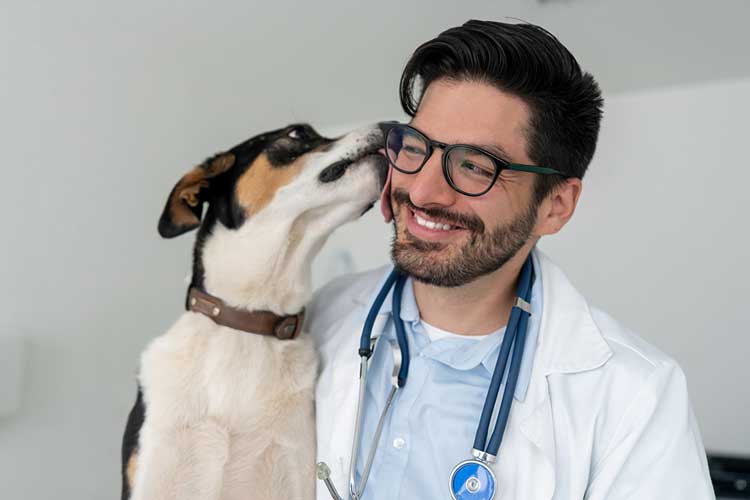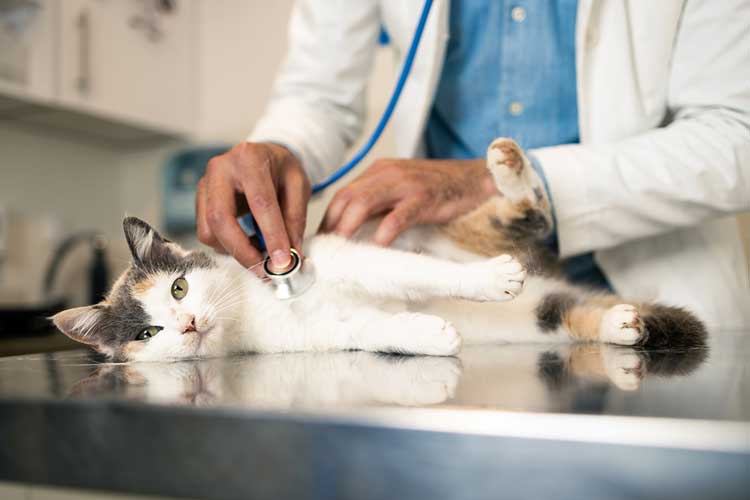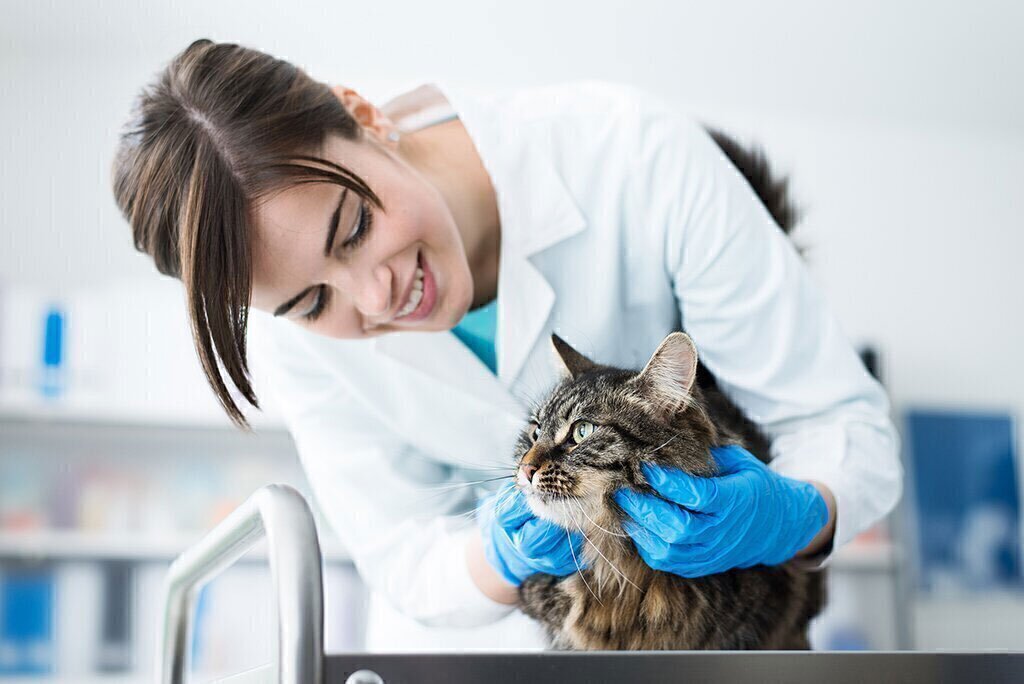How to Find the Best Vet for Your Pet
Last updated May 2025

You might not be able to evaluate all of a veterinarian’s technical skills and expertise. But you can judge many factors that are central to good medical care for your pet.
What Do Clients Say?
Our Ratings Tables show feedback we received for area veterinary practices from our surveys of consumers. We regularly survey Consumers’ Checkbook subscribers, plus other randomly selected individuals in the area whom we invite to submit ratings. Click here for further discussion of our customer survey and other research methods.
Our Ratings Tables list practices that received at least 10 ratings on our surveys, which asked consumers to rate their vets on the following:
- Listening to/communicating with you
- Arranging to see you quickly
- Giving helpful advice by phone or email
- Maintaining a pleasant office and staff
- Giving prevention/self-help advice
- Helping keep pet’s medical costs down
- Spending enough time with you
- Apparent competence/thoroughness
- Overall care and advice
Our Ratings Tables report the percent of surveyed customers who rated each practice “superior” (as opposed to “adequate” or “inferior”) on each question. Note that most ratings that weren’t “superior” were at least “adequate,” and that because these ratings relate to raters’ experiences over a period of years, various aspects of a veterinary practice may have changed.
Most veterinarians are intelligent and well-trained. In addition to completing four years of college and four years of veterinary school, almost all have undergone several additional years of practical training in a clinical setting. For many years it has been more difficult to obtain admission to veterinary schools than to medical schools, and to qualify to practice, graduates must pass an exam that’s as difficult as the one for physicians.
While most of the feedback we receive for area practices is favorable, not every vet has all the qualities you want: Some practices received low scores on many survey questions.
Consider several other factors before deciding that a vet is right for your pet and for you.

Which Animals Do They Treat?
Almost all vets care for dogs and cats; some will treat small mammals (rodents, rabbits, etc.). But many won’t treat birds and reptiles, and very few treat farm animals. Make sure the vet is not only willing but experienced and interested in caring for the pet you have.
Do They Offer a Convenient Location and Hours?
Since there are many good vets in the area, you may as well choose a practice located close to your home. It will be convenient for routine visits and more accessible in an emergency or if your pet must be hospitalized.
Also check on office hours. Most vets have some evening or weekend hours.
We asked customers to rate vets on “arranging to see you quickly,” a factor crucial to your peace of mind and to the comfort—and perhaps survival—of your pet.
Also find out how a vet handles emergency care outside of office hours. Only a handful of the practices listed on our Ratings Tables are 24/7 animal hospitals. Some vets provide clients with phone numbers to contact them for emergencies and will meet you at their offices for emergencies; others merely refer clients to nearby 24-hour facilities. Ask any prospective vet exactly what kind of emergency response you can expect.
How Is Communication?
You want a likeable vet who is a good communicator. Our Ratings Tables report scores for our survey question about “listening to/communicating with you.” Our Ratings Tables also indicate how practices rated on “spending enough time with you,” a critical aspect of adequate communication.
Vets should make you feel comfortable asking questions. They should clearly explain what’s wrong with your pet, what they can do about it, and what results you can expect. A vet should admit their limitations, tell you when to consult a specialist, and talk openly about costs. All this lets you make decisions based on your finances, your devotion to your pet, and your informed understanding of the prognosis.
Does Care Seem Competent and Thorough?
It’s hard to know whether a new veterinarian will make correct diagnoses and prescribe the right treatments. But you can learn a great deal about their competence and thoroughness early on. Does the vet perform a thorough exam and take a complete medical history, asking about previous medical problems, previous occurrences of the current problem, and which treatments have worked? If your pet is referred to a specialist, does your primary vet follow up and keep a record of the results? If tests are administered, does the vet get the results and share them with you? Our Ratings Tables indicate what other pet owners have found.
Do They Show Concern and Friendliness?
When you first visit a vet, note whether they treat your pet gently and ask you to provide relevant facts about it. Also see how your pet responds to the vet. It’s a good sign if the vet displays bulletin boards listing lost pets and pets available for adoption, distributes Humane Society brochures, volunteers in some kind of humane work, and discusses their own fur babies.
Also ask about policies on visiting hospitalized pets. Flexibility reflects concern for you and your pet.
Advice on Prevention and Home Care
Seek a vet who will provide thorough advice and comprehensive materials to help you avoid future office visits. For the health of your pet—and your wallet—the vet should offer advice on disease prevention, ways to spot health problems on your own, and how to deal with illnesses. Our Ratings Tables report how each practice rated.
Can You Tour It?
To judge the quality of a practice, you must see treatment rooms plus the cages and runs where animals are temporarily held or boarded. Many clinics allow customers to tour the entire facility during regular office hours. If a vet doesn’t allow this, ask why.
Is the Facility Clean?
A vet practice should be kept as clean and sterile as a hospital for humans. This means a waiting room and treatment rooms free of debris from previous patients, treatment tables that are disinfected after each exam, and staff that keep their clothes and hands clean.
Hospital Accommodations
Make sure the facilities are bright, clean, and well-ventilated, and that animals are separated from one another, so that they will not hurt each other or transmit diseases. Click here for advice on finding the best kennels.
Can You Get Advice by Phone or Email?
To save time and money—and to quickly deal with your pet’s needs—you’ll need meaningful advice quickly. Our Ratings Tables show the survey results for our question “giving helpful advice by phone or email.”
Does Accreditation Matter?
Veterinary hospitals earn accreditation from the American Animal Hospital Association (AAHA) by meeting certain minimum standards: maintaining adequate medical records and providing complete diagnostic, pharmacy, anesthetic, surgical, nursing, dental, and emergency facilities.
Interestingly, AAHA accreditation seems to have little relationship to our other quality measures. For example, on our customer survey question “apparent competence/thoroughness,” AAHA-accredited practices, on average, score about the same as non-accredited practices. And an AAHA-accredited practice might cost you more: The average price comparison score (described below) for AAHA-accredited practices is about 10 percent higher than non-accredited ones.

Avoid High Prices
Although you want the best possible care for your furry friends, you don’t want it to drain your life’s savings. Unfortunately, this is an area where consumers are often dissatisfied. The most common complaints we receive from vet customers concern excessive or unexpectedly high bills.
The price comparison scores reported on our Ratings Tables help you compare fees. Our undercover shoppers called vets for their prices for six different procedures, shown below. The scores show how each vet’s prices compare to the average prices for all surveyed vets for the same mix of procedures. The scores are adjusted so that the average price comparison score is $100. Prices for a vet with a score of $90, then, were 10 percent lower than the average. We find that most vets are quite consistent in their pricing, so a vet with a low price comparison score is likely to charge low prices for other treatments.
Of course, charging low prices is not the only way a vet can save you money. You also save if the vet shows you how to effectively prevent disease and injuries, and care for your pet yourself. Our customer survey question on “giving prevention/self-help advice” addresses these issues.
Equally important, you want a vet who informs you about lower-cost care alternatives and doesn’t perform more procedures than necessary. Unfortunately, our survey question on “helping keep pet’s medical costs down” received the lowest survey scores. Many commented that vets not only failed to consider and discuss lower-cost treatment alternatives, but also pushed costly treatments of little value.


